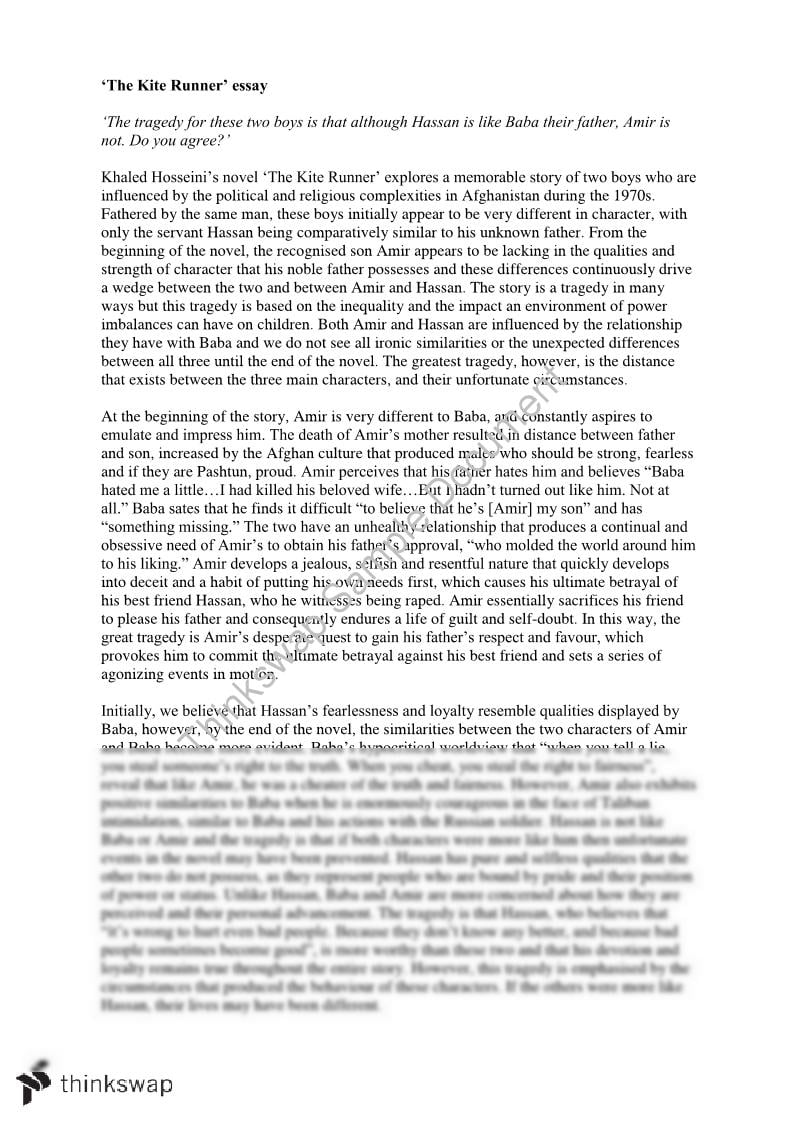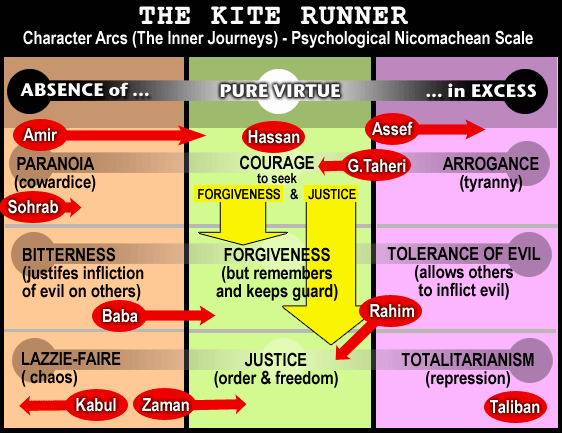The Kite Runner In Nigeria: A Study Of Pragmatism And Moral Compromise

Table of Contents
This article explores Khaled Hosseini's The Kite Runner within the specific cultural context of Nigeria, examining how the novel's themes of pragmatism and moral compromise resonate with, and perhaps diverge from, Nigerian experiences. We will analyze how the characters' choices, particularly Amir's journey of redemption, can be interpreted through the lens of Nigerian societal values and the complexities of navigating moral dilemmas. The enduring power of The Kite Runner lies in its exploration of universal human experiences, and examining it through a Nigerian lens reveals fascinating new perspectives on themes of guilt, forgiveness, and the search for identity.
Pragmatism and Survival in the Face of Adversity
This section explores how the characters' pragmatic choices in The Kite Runner – often born out of necessity and fear – mirror similar struggles faced in Nigerian society. The novel depicts a world shaped by violence, political instability, and economic hardship, forcing characters to make difficult choices to survive. This resonates deeply with the realities faced by many Nigerians, who often navigate challenging circumstances with remarkable resilience and resourcefulness.
-
Examples of Amir's pragmatic actions and their consequences: Amir's inaction in the face of Hassan's assault is a prime example of pragmatism driven by fear and self-preservation. This act, born of cowardice, shapes the rest of his life, highlighting the long-term consequences of prioritizing self-interest over moral integrity. Similarly, his later actions in Kabul, driven by a desperate need to protect himself and Sohrab, demonstrate a pragmatic approach to survival in a war-torn environment.
-
Comparison with similar survival strategies in Nigerian contexts: Consider the economic challenges faced by many Nigerians, forcing them into difficult choices regarding employment, resource allocation, and even ethical compromises to provide for their families. Political instability and corruption also create environments where pragmatism, sometimes bordering on moral compromise, becomes a survival mechanism. The pressures of poverty and the need to provide for one's family often overshadow strict adherence to moral codes.
-
Analysis of how societal pressures influence moral decision-making in both the novel and Nigerian society: Both Afghan and Nigerian societies exert considerable pressure on individuals to conform to certain behaviors and expectations. These pressures can significantly influence moral decision-making, leading individuals to compromise their values in order to maintain social standing or avoid negative consequences. This complex interplay between personal morality and societal expectations is a central theme in The Kite Runner and a significant aspect of the Nigerian experience.
The Weight of Guilt and the Pursuit of Redemption
Amir’s profound guilt and his long journey toward redemption are central to The Kite Runner. This section examines its relevance to Nigerian cultural understandings of atonement and forgiveness. The novel’s exploration of guilt and redemption resonates across cultures, as the need for forgiveness and reconciliation is a universal human experience.
-
Exploring the concept of "egun" (ancestral spirits) in Yoruba culture and its comparison to the spiritual burden Amir carries: The Yoruba concept of "egun," ancestral spirits who influence the lives of the living, provides a parallel to the spiritual burden Amir carries. Just as the egun demand respect and appeasement, Amir's guilt demands atonement and reconciliation. Both highlight the enduring impact of past actions on the present and future.
-
Discussion of forgiveness and reconciliation in Nigerian traditions: Many Nigerian cultures place a strong emphasis on forgiveness and reconciliation as pathways to healing and social harmony. Traditional conflict resolution mechanisms often prioritize restorative justice over punitive measures. This mirrors Amir's eventual pursuit of redemption, showcasing the power of forgiveness in overcoming the weight of guilt.
-
Analyzing the different pathways to redemption presented in the novel and their applicability to Nigerian social structures: The novel presents a complex, multi-faceted path to redemption for Amir. This involves confronting his past, making amends for his actions, and demonstrating genuine remorse. These actions are applicable across cultures and resonate deeply within the context of Nigerian traditions emphasizing restorative justice and communal reconciliation.
Cultural Context and Cross-Cultural Interpretations
This section analyzes how the setting and themes of The Kite Runner – focusing on Afghanistan’s cultural landscape and its diaspora – can be viewed and interpreted through a Nigerian lens. Despite the geographical distance and differing cultural contexts, the novel's themes of displacement, identity, and the search for belonging transcend national borders.
-
Comparison between the societal structures of Afghanistan and Nigeria, highlighting similarities and differences: Both Afghanistan and Nigeria have experienced periods of political instability, colonial influence, and internal conflict. However, their societal structures, religious traditions, and cultural norms differ significantly. Comparing these differences helps illuminate the universality of certain human experiences, despite differing cultural contexts.
-
Analyzing the impact of colonialism and its legacy on both nations, considering the theme of power dynamics: Colonialism left a lasting impact on both Afghanistan and Nigeria, shaping their political landscapes and social structures. The novel highlights power dynamics within Afghan society, reflecting similar dynamics present in Nigeria's colonial past and its ongoing social and political realities.
-
Exploring the experiences of diaspora communities in both countries and their unique challenges: Both Afghanistan and Nigeria have significant diaspora communities facing challenges related to identity, belonging, and cultural adaptation. Comparing these experiences highlights the shared struggles of individuals navigating life away from their homelands.
Moral Compromise and the Search for Identity
This section examines the idea of moral compromise as a recurring theme in the novel and explores its relevance to identity formation in Nigerian society. The characters' struggles with moral ambiguity are not unique to Afghanistan; they represent a fundamental aspect of the human experience, particularly relevant in the formation of individual identity.
-
Discussing how characters' choices reflect a complex interplay between personal morality and societal expectations: The characters in The Kite Runner constantly navigate a complex interplay between their personal moral codes and societal expectations. Their choices, whether pragmatic or morally questionable, significantly shape their identities and self-perceptions. This is a universally relatable aspect of the human experience.
-
Analyzing the role of family and community in shaping moral values in both Afghanistan and Nigeria: Family and community play a crucial role in shaping moral values in both Afghan and Nigerian societies. The impact of family expectations and social pressures on individual moral choices is a key theme in The Kite Runner, easily understood in the Nigerian context.
-
Examining how navigating moral ambiguity contributes to self-discovery and identity formation: The process of grappling with moral dilemmas and making difficult choices is central to self-discovery and identity formation. Amir's journey of redemption illustrates how confronting moral ambiguity can lead to a deeper understanding of oneself and one's place in the world—a message powerfully resonant in Nigerian society.
Conclusion
This analysis of The Kite Runner within a Nigerian context reveals surprising parallels between seemingly disparate cultures. The novel's exploration of pragmatism, moral compromise, guilt, and redemption offers a powerful framework for understanding the complexities of human experience, applicable across diverse social and cultural landscapes. The enduring themes of The Kite Runner resonate deeply with Nigerian readers, prompting reflections on personal morality, societal pressures, and the continuous quest for meaning and redemption. Further research into the cross-cultural reception of The Kite Runner and its implications for understanding universal human experiences is encouraged. Further studies examining the novel’s reception in Nigeria, and its impact on literary criticism in the region, would greatly enhance our understanding of The Kite Runner’s continued relevance. Reading and discussing The Kite Runner within diverse cultural contexts opens up avenues for meaningful conversations about shared human experiences and the enduring power of literature to connect us across borders.

Featured Posts
-
 Giakoymakis Odigei Tin Kroyz Azoyl Ston Teliko Toy Champions League
May 20, 2025
Giakoymakis Odigei Tin Kroyz Azoyl Ston Teliko Toy Champions League
May 20, 2025 -
 Nyt Mini Crossword Answers March 26 2025 Helpful Hints
May 20, 2025
Nyt Mini Crossword Answers March 26 2025 Helpful Hints
May 20, 2025 -
 Cultural Context And Moral Choices Nigeria And The Kite Runners Dilemma
May 20, 2025
Cultural Context And Moral Choices Nigeria And The Kite Runners Dilemma
May 20, 2025 -
 Tampoy Mega Pliris Synopsi Toy Apopsinoy Epeisodioy
May 20, 2025
Tampoy Mega Pliris Synopsi Toy Apopsinoy Epeisodioy
May 20, 2025 -
 Ignoring High Stock Market Valuations The Bof A Rationale
May 20, 2025
Ignoring High Stock Market Valuations The Bof A Rationale
May 20, 2025
